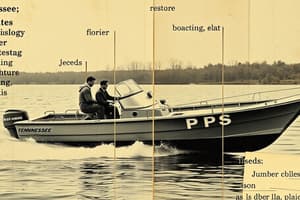Podcast
Questions and Answers
What is the term for the front of a vessel?
What is the term for the front of a vessel?
- Port
- Bow (correct)
- Starboard
- Stern
What is the term for the rear of a vessel?
What is the term for the rear of a vessel?
- Bow
- Stern (correct)
- Hull
- Beam
What does starboard refer to?
What does starboard refer to?
- Right side of a vessel (correct)
- Left side of a vessel
- Rear of a vessel
- Front of a vessel
What is the term for the left side of a vessel?
What is the term for the left side of a vessel?
What part of a vessel is referred to as the hull?
What part of a vessel is referred to as the hull?
What is a gunwale?
What is a gunwale?
What is the function of a propeller?
What is the function of a propeller?
What does beam refer to in boating terms?
What does beam refer to in boating terms?
What does freeboard measure?
What does freeboard measure?
What does draft refer to?
What does draft refer to?
What is the keel of a vessel?
What is the keel of a vessel?
What are the two basic types of boat hulls?
What are the two basic types of boat hulls?
Describe the hull-displacement mode.
Describe the hull-displacement mode.
Describe the hull-planing mode.
Describe the hull-planing mode.
What is personal watercraft?
What is personal watercraft?
What does length overall dictate in a vessel?
What does length overall dictate in a vessel?
What is the function of a rudder?
What is the function of a rudder?
What class does a vessel less than 16 feet belong to?
What class does a vessel less than 16 feet belong to?
What class does a vessel between 16 feet to less than 26 feet belong to?
What class does a vessel between 16 feet to less than 26 feet belong to?
What class does a vessel from 26 feet to less than 40 feet belong to?
What class does a vessel from 26 feet to less than 40 feet belong to?
What class does a vessel from 40 feet to less than 65 feet belong to?
What class does a vessel from 40 feet to less than 65 feet belong to?
What is the advantage of outboard engines?
What is the advantage of outboard engines?
Flashcards are hidden until you start studying
Study Notes
Vessel Terminology
- Bow: Front of a vessel.
- Stern: Rear of a vessel.
- Starboard: Right side of a vessel.
- Port: Left side of a vessel.
- Hull: Body of a vessel.
- Gunwale: Upper edge of the vessel's side; commonly pronounced "gunnel."
- Cleat: Metal fitting used to fasten a rope.
Boat Components
- Propeller: Rotates to propel a boat forward or backward.
- Beam: The maximum width of a vessel.
- Freeboard: Distance from the waterline to the lowest point where water could enter the boat.
- Draft: Depth of water needed for a vessel to float.
- Keel: Main centerline or backbone of a vessel that enhances stability.
Hull Types
- Hull-Displacement: Designed to push water aside; slower speeds and smooth travel through water. Common in large cruisers and most sailboats.
- Hull-Planing: Rises to glide on top of the water with sufficient power; operates differently at rest and high speeds. Common in small power vessels and personal watercraft.
Boat Operation Modes
- Planing-Displacement Mode: A planing hull operates like a displacement hull at very slow speeds.
- Planing-Plowing Mode: As speed increases, a raised bow reduces visibility and creates a large wake; should be avoided.
- Planing Mode: Occurs when enough power enables the boat to glide on the water; different boats reach this mode at varying speeds.
Measurement and Classification
- Measuring Length Overall: The overall length of a vessel from the tip of the bow to the stern, excluding attachments.
- Length Overall: Actual length of the hull not including any attachments.
- Rudder: A vertical blade used for steering, typically located near the stern.
Classification of Vessels
- Class A: Vessels under 16 feet.
- Class 1: Vessels from 16 feet to less than 26 feet.
- Class 2: Vessels from 26 feet to less than 40 feet.
- Class 3: Vessels from 40 feet to less than 65 feet.
Engine Types
- Outboard Engines: More power per pound than inboard engines; consists of an engine, gear case, and propeller. Predominantly two-stroke but increasingly four-stroke designs are available.
Studying That Suits You
Use AI to generate personalized quizzes and flashcards to suit your learning preferences.




